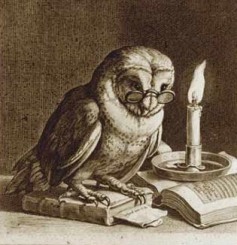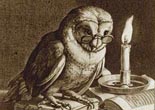Ron Berger, with a little help from my friends —
 A few weeks ago, I was having a conversation with my son and 10-year-old granddaughter. I was giving them some advice and my son told my granddaughter that I was “smart.” I said I thought there was a difference between being “smart” and having “wisdom,” although I did not have a good explanation of what that difference actually entails.
A few weeks ago, I was having a conversation with my son and 10-year-old granddaughter. I was giving them some advice and my son told my granddaughter that I was “smart.” I said I thought there was a difference between being “smart” and having “wisdom,” although I did not have a good explanation of what that difference actually entails.
Afterwards, I thought I’d raise this issue with some of my friends on email. This was before I was on Facebook, so the friends who responded were people I actually know. All of them are current or former public school teachers or college professors.
In my initial prompt to my friends, I gave a pithy definition, “My first impulse is to say that wisdom is smart plus old age. As I consider all of you wise, any feedback you can give me would be most welcome.”
I was surprised by how many people were willing to respond in a “reply to all” email thread, and those who did said it would be okay to use their names in this essay. My aim here is not to evaluate or synthesize the responses, but to simply present them in one place.
The first few responses I received were short and to the point:
Sheila Plotkin: “Smart means you can learn new information easily. Having wisdom means you understand that there’s lots of information you haven’t learned yet.”
Randy Stoecker: “Smart is being able to achieve goals. Wise is knowing which goals to achieve.”
Charles Green: “Smarts is knowing how to do something well. Wisdom is knowing whether or not to do it.”
Denny Blackmore, a former high-school English teacher, made a more extended remark: “I don’t know whether the following reflects wisdom or smarts, but it is a kind of conclusion my students and I arrived at near the end of our discussion of [Alvin Toffler’s] Future Shock… Here is the conclusion: a byte is not necessarily data; data is not necessarily information; information is not necessarily knowledge; knowledge is not necessarily understanding; understanding is not necessarily wisdom; wisdom is not necessarily foresight. What allows each of these ideas to be significant is insight. One arrives at insight with experience. Experience begins with a byte.”
Kent Sandstrom offered a quote from Torri Hunter, one of his favorite baseball players: “Wisdom is something learned from healed pain and a lot of failures… I tell people it’s not that I’m wise, it’s just that I’ve experienced a lot of pain caused by failure.” Kent added, “Of course, the key is not just experiencing the pain, but also being able to learn from it, thereby transforming it into something that can help you grow wiser. I think ‘wisdom’ has to be grounded in humility, an understanding of human folly and limitations, and an ability to empathize with others. ‘Smarts’ doesn’t seem to have the same kind of depth.”
Wade Dazey, who has a scholarly specialization in religious studies, was more formally philosophical: “For now I will share two understandings of wisdom that come to mind: one from Plato and the other from Asian wisdom traditions… I think that for Plato wisdom is knowledge of the good, that is, knowledge of what is best for the individual or the group as a whole. In today’s language it is a holistic knowledge of how the parts can best function together for the well-being of the organism or group (or planetary biosphere) as a whole… Asian religious traditions point to wisdom as a direct, intuitive knowledge of ultimate reality, an understanding of reality at its most profound level. Different words, concepts and images are used to point to this non-dual, all embracing reality of which we are a part: Brahman, Emptiness, Buddha Nature, Tao. In any case, this wisdom does seem to have an emotional or affective dimension that makes sages especially compassionate, kind and spontaneous… Taoists remind us of course that those who know don’t say… so I’ll stop here.”

Bill Powell, who has read a good deal of literature on this topic, offered the most extensive comments of all, beginning with a Google search that provides several “definitions…that include things like…common sense to an uncommon degree, able to find the best means to the best ends, discerning, sagacity, etc.” Bill also noted that “There is a wisdom in Buddhism and wisdom in nearly all native cultures and religions. The Golden Rule is a bit of wisdom that we don’t see as such anymore. There is…knowledge about the human condition and animals and plants and life generally. Wisdom has a kissing cousin in mysticism.”
“…People…[can] become unglued when they try to use their intellect to define something like wisdom that is not entirely intellectual…[but my] sense is that it involves the development of cognitive circuitry over a period of years that is different from other people… Wise people develop the circuitry to see and make sense of the world in ways others don’t… All of us have rewired our [brains] to know what we know better than most others and have a different perspective on things. Emily Dickinson might have called it a different slant of light on things…”
“…Wisdom also includes well developed skills at pattern recognition (also helps with math)—to see connections and repeated events. Wise people probably are better at perceiving/apprehending how things play out over time—they think in time. They attend to things and notice details and have skills at being ‘present,’ [and] they are often empathic and sense how emotions play into events and behaviors… They know that intuition is built (often imperfectly) on a base of subtly remembered facts and experiences and observations that may be, in large part, unconscious; and they listen to their own intuition but don’t trust it blindly—it’s just another data source… They know a bit about improvisation—of making do as needed… They likely have an ‘analogical imagination’—they can see analogical connections between things and find similarities that help understand underlying principles and the ways that things play out. They may think metaphorically for the same reason… They likely are fairly moral people—they do want the best outcomes of their thoughts… They have a human need to have their wisdom matter… They are human and make stupid mistakes too—and know it!”
“I think…[people] hone their peculiar conglomeration of skill and abilities…[and] mature into wisdom…over time…with a lot of practice and failure… It’s never yes/no about wisdom = you are or you aren’t… On some occasions yes, and on others no, but it takes time. There’s a learning curve.”
“…But, wise folks also have to think and function like everyone else too… It’s like being bilingual…[because] wise people have to have two or more ways of thinking and conceiving the world. They have to be members of the tribe of humankind: wise + normal. Wise people often, probably, have to hide their wisdom… Being wise all the time would probably badly warp your social life.”
“…Wisdom is also tacitly about epiphanal loneliness because the poor blighted fools don’t have a group to belong to or many drinking buddies who grasp it all either. They may be smart in ways that there are no words to describe and no one else can see… Most of them know full well that there are a zillion gaps in their knowledge…”
“[Ron’s] original question and all the responses that followed were interesting and informative. I suspect that ‘wisdom’ and ‘smarts’ both have vague and malleable definitions…but are also not without a fair amount of overlap… A portion of wisdom has often been thought to be common sense and [Ron’s] question and the feedback certainly seem like attempts at adding common sense to the discussion…and then illustrating perspectives/different facets on the same gem. I think [the] original question was evocative of wisdom and the responses add to our common thoughts about it. I suspect we can be smart without being wise, but can we be wise without being smart in some ways?”
After hearing all these responses, Charles Cottle, who had laid back awhile, simply added: “I thought about asking about the difference between ‘prudence’ and ‘wisdom.’” To this Wade noted, “‘Prudence’ normally just implies the careful management of practical affairs, but it is interesting that it is etymologically derived from Latin word ‘providentia,’ meaning ‘foresight.’” Bill remarked, “Wisdom can give people some capacity for foresight, but it’s not always a happy ability to see what may be lying down the road.”
Wade also wrote, “I enjoyed all the responses. You have wise friends! We seem to recognize wisdom, even if we can’t define it… Trying to define wisdom reminds me of the famous saying of Justice Potter Stewart regarding the difficulty of defining obscenity. It may be hard to define, but ‘we know it when we see it.’”
Epilogue: A few weeks later, I revisited the question of smart versus wisdom with my 10-year-old granddaughter. She offered this definition, which may be as good as any: “Smart is knowing all the math problems and things like that. Wisdom is you can tell the future.”


Sorry for this “smart” comment, but I cannot resist:
Smart is knowing that a tomato is a fruit.
Wisdom is not putting it in a fruit salad.
Philosophy is wondering if that means ketchup is a smoothie.
LikeLiked by 2 people
According to Richard Nixon, ketchup is a vegetable. 🙂
LikeLiked by 1 person
I think it was Ronald Reagan who said this, unless I missed Richard Nixon’s earlier comment, in which case Reagan would be a plagiarizer.
LikeLike
You may be right. It just sounds like a Nixon thing.
LikeLiked by 1 person
Loved all the comments.
The discussion got me wondering—As I use the word, and as Wade points out, Plato and Eastern religions use the word, ‘wise’ is always Good. If a sociopath is smart with a keen sense of significance and connection–but uses those smarts and that sense or insight to pursue his/her one and only value (selfishness), I don’t call that person ‘wise.’ Is there a meaning of that word which would allow a person be both ‘wise’ and evil?
Perhaps ‘wise’ is not an all-or-nothing thing. Darth Vader, to use a caricature for an example, could be said to be wise in the ways of the Empire and its minions–and wise, when push came to shove, that he chose wisely between his son and the Emperor. But if you’ve spent your entire adult life pursuing galactic domination and killing people…
LikeLike
I thought I would add the meaning of “mensch” to the discussion.
https://en.wikipedia.org/wiki/Mensch
LikeLike
Thanks to George Savage on Facebook for this one.
LikeLike
When the idea for this article started some time ago, I somewhat flippantly wrote that I thought wisdom was being smart plus old age. I’m beginning to think that I was right in the sense that being old gives you a sense of the “long view” and that wisdom may be a matter of being smart—which I would modify to say being “thoughtful”—seasoned with the experience of old age. When my granddaughter said that she thought wisdom entailed being able to tell the future, I think that the more you have seen of the past, the more you are able to anticipate the future—both in its ideal and dismal potentialities.
LikeLike